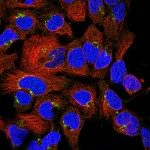Lien vers Pubmed [PMID] – 28724527
J. Cell Biol. 2017 09;216(9):2633-2644
Progression of pathology in neurodegenerative diseases is hypothesized to be a non-cell-autonomous process that may be mediated by the productive spreading of prion-like protein aggregates from a “donor cell” that is the source of misfolded aggregates to an “acceptor cell” in which misfolding is propagated by conversion of the normal protein. Although the proteins involved in the various diseases are unrelated, common pathways appear to be used for their intercellular propagation and spreading. Here, we summarize recent evidence of the molecular mechanisms relevant for the intercellular trafficking of protein aggregates involved in prion, Alzheimer’s, Huntington’s, and Parkinson’s diseases. We focus in particular on the common roles that lysosomes and tunneling nanotubes play in the formation and spreading of prion-like assemblies.

